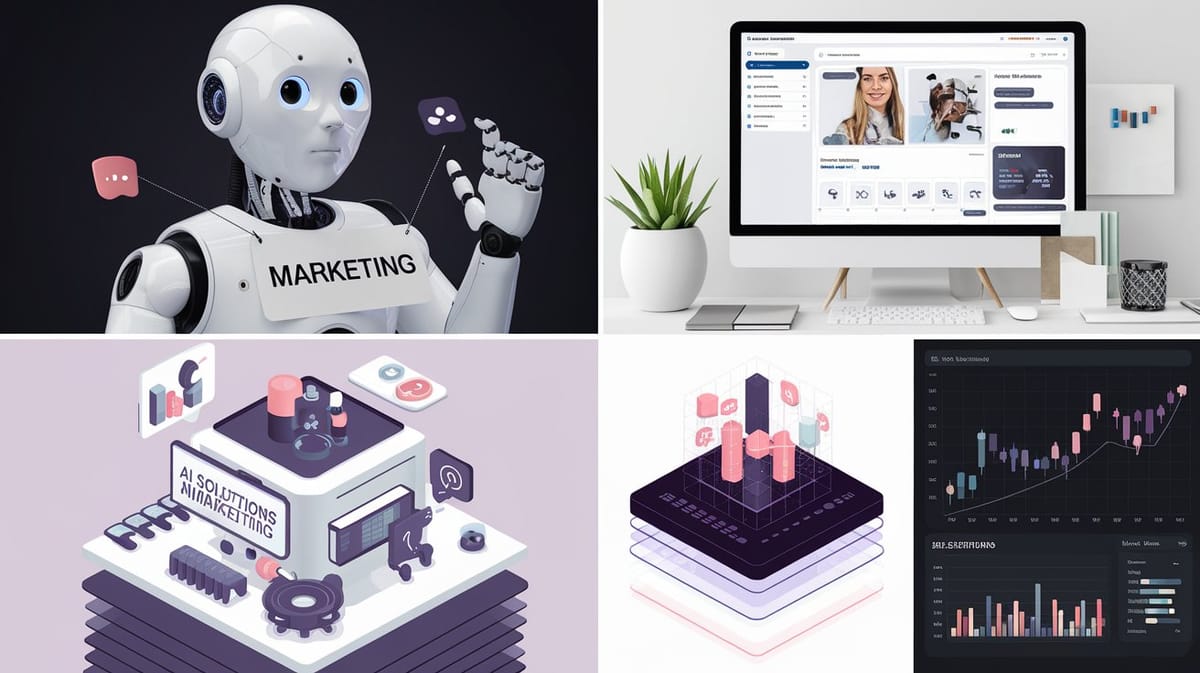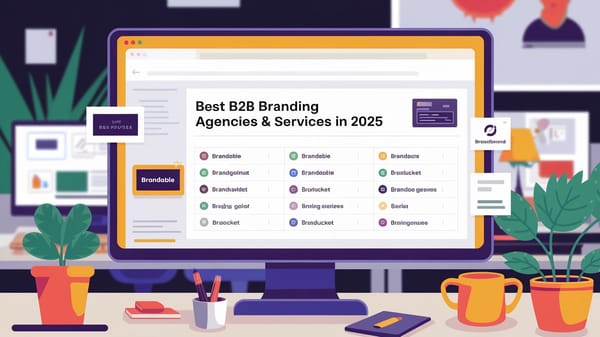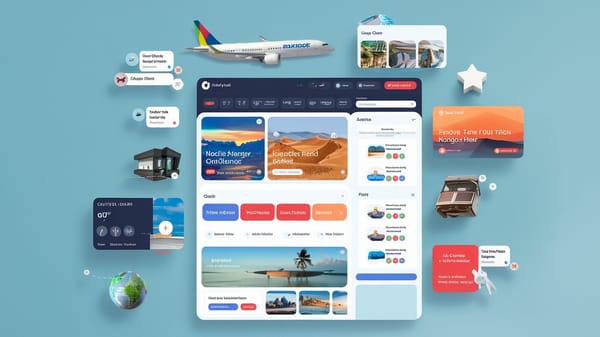Exploring the Impact of AI Solutions in B2B Marketing

AI B2B solutions are emerging as transformative tools that redefine how companies engage with their clients and optimize their marketing strategies. As businesses strive to enhance efficiency, personalization, and data-driven decision-making, AI technologies are becoming indispensable in the B2B sector.
AI solutions in B2B marketing encompass a wide array of applications designed to automate and enhance various marketing tasks. These include customer segmentation, lead scoring, content generation, and real-time product recommendations. By leveraging AI, businesses can create a comprehensive 360-degree view of their customers, enabling more targeted and personalized interactions. For instance, tools like Salesforce's Einstein AI utilize predictive lead scoring to analyze historical customer data and behavior, helping sales teams focus on the most promising prospects and improving conversion rates.
Generative AI tools such as ChatGPT, Jasper AI, and Midjourney are revolutionizing content personalization and advertising. These tools can dynamically adjust ad titles, meta descriptions, and landing page content based on factors that drive conversions, thus enhancing the effectiveness of paid ad campaigns.
You can also visit Oncely.com to find more Top Trending AI Tools. Oncely partners with software developers and companies to present exclusive deals on their products. One unique aspect of Oncely is its “Lifetime Access” feature, where customers can purchase a product once and gain ongoing access to it without any recurring fees. Oncely also provides a 60-day money-back guarantee on most purchases, allowing customers to try out the products and services risk-free.
Oncely are hunting for the most fantastic AI & Software lifetime deals like the ones below or their alternatives:

Table of Contents
- Understanding B2B AI Solutions
- Definition and Scope of B2B AI Solutions
- Key Applications of B2B AI Solutions
- Benefits of Implementing B2B AI Solutions
- Market Trends and Future Outlook
- Applications of AI in B2B Marketing
- Customer Segmentation and Personalization
- Predictive Analytics and Lead Scoring
- Content Generation and Optimization
- Marketing Automation and Efficiency
- Enhancing Customer Experience
- Challenges and Future Prospects of AI in B2B
- High Costs and Resource Requirements
- Data Privacy and Security Concerns
- Lack of Understanding and Expertise
- Identifying Valid Use Cases
- Future Prospects of AI in B2B
- Enhanced Customer Experience
- Predictive Targeting and Analytics
- Automation and Efficiency
Understanding B2B AI Solutions
Definition and Scope of B2B AI Solutions
B2B AI solutions refer to artificial intelligence technologies and applications specifically designed to enhance business-to-business interactions and operations. These solutions leverage AI capabilities such as machine learning, natural language processing, and computer vision to automate processes, improve decision-making, and drive efficiency in business operations. The scope of B2B AI solutions is broad, encompassing various industries including manufacturing, finance, healthcare, and logistics, among others.
AI solutions in the B2B sector are tailored to address specific business needs such as supply chain optimization, customer relationship management, and predictive analytics. For instance, AI-driven supply chain solutions can predict demand fluctuations and optimize inventory levels, thereby reducing costs and improving service levels (Forbes).
Key Applications of B2B AI Solutions
-
Supply Chain and Logistics
AI solutions in supply chain management enhance visibility and efficiency by predicting demand, optimizing routes, and managing inventory. Machine learning algorithms analyze historical data to forecast demand, enabling businesses to adjust their production schedules and inventory levels accordingly. For example, AI-powered logistics platforms can optimize delivery routes in real-time, reducing fuel consumption and improving delivery times (McKinsey & Company).
-
Customer Relationship Management (CRM)
AI-enhanced CRM systems use natural language processing and machine learning to analyze customer interactions and predict customer needs. These systems can automate routine tasks such as data entry and customer follow-ups, allowing sales teams to focus on building relationships. AI can also provide insights into customer behavior, helping businesses tailor their marketing strategies and improve customer satisfaction (Gartner).
-
Predictive Maintenance
In industries such as manufacturing and energy, predictive maintenance powered by AI can significantly reduce downtime and maintenance costs. AI algorithms analyze data from sensors and equipment to predict when a machine is likely to fail, allowing businesses to perform maintenance before a breakdown occurs. This proactive approach not only extends the lifespan of equipment but also enhances operational efficiency (Deloitte).
-
Fraud Detection and Cybersecurity
AI solutions are increasingly used in fraud detection and cybersecurity to protect businesses from financial losses and data breaches. Machine learning models can identify unusual patterns in transaction data, flagging potential fraudulent activities for further investigation. In cybersecurity, AI systems can detect and respond to threats in real-time, providing a robust defense against cyberattacks (IBM).
-
Human Resources and Talent Management
AI in human resources streamlines recruitment processes by automating resume screening and candidate matching. AI tools can analyze job descriptions and candidate profiles to identify the best fit for a position, reducing the time and cost associated with hiring. Additionally, AI can assist in employee engagement and retention by analyzing employee feedback and predicting turnover risks (PwC).
Benefits of Implementing B2B AI Solutions
The implementation of B2B AI solutions offers numerous benefits, including increased efficiency, cost savings, and enhanced decision-making capabilities. By automating routine tasks, businesses can allocate resources more effectively and focus on strategic initiatives. AI solutions also provide valuable insights through data analysis, enabling businesses to make informed decisions and stay competitive in the market.
Moreover, AI solutions can improve customer experiences by personalizing interactions and providing timely responses to inquiries. In the supply chain, AI can enhance transparency and collaboration among partners, leading to more resilient and agile operations (Accenture).
Market Trends and Future Outlook
The B2B AI market is experiencing rapid growth, driven by advancements in AI technologies and increasing demand for automation and data-driven insights. According to a report by MarketsandMarkets, the global AI in the B2B market is projected to grow from USD 15.7 billion in 2023 to USD 110.7 billion by 2028, at a compound annual growth rate (CAGR) of 47.2% (MarketsandMarkets).
Key trends shaping the future of B2B AI include the integration of AI with Internet of Things (IoT) devices, the rise of AI-powered platforms for small and medium-sized enterprises (SMEs), and the increasing focus on ethical AI practices. As businesses continue to adopt AI solutions, the emphasis on data privacy and security will also grow, prompting the development of more robust regulatory frameworks (IDC).
In conclusion, B2B AI solutions are transforming the way businesses operate, offering significant advantages in terms of efficiency, cost-effectiveness, and strategic decision-making. As the market continues to evolve, businesses that leverage AI technologies will be better positioned to navigate the challenges and opportunities of the digital age.
Applications of AI in B2B Marketing
Customer Segmentation and Personalization
AI technologies have significantly enhanced the ability of B2B marketers to segment their audiences and personalize interactions. By leveraging machine learning algorithms, businesses can analyze vast amounts of customer data to create detailed buyer personas and segment audiences based on behavior, preferences, and purchasing history. This capability allows for more targeted marketing strategies, ensuring that the right message reaches the right audience at the right time. For instance, AI tools can integrate CRM data to provide a 360-degree view of each customer, enabling marketers to tailor their communications and offers (Delve AI).
Personalization extends beyond email marketing to include real-time product recommendations and dynamic content generation. AI-driven platforms can adjust website content, email subject lines, and even product offerings based on user interactions and preferences, thereby enhancing the customer experience and increasing engagement rates. This level of personalization is crucial in B2B marketing, where decision-making often involves multiple stakeholders and complex buying processes.
Predictive Analytics and Lead Scoring
Predictive analytics is another area where AI is making a substantial impact in B2B marketing. By analyzing historical data and identifying patterns, AI can predict future customer behaviors and trends. This capability is particularly useful in lead scoring, where AI models assess the likelihood of a lead converting into a customer. Tools like Salesforce's Einstein AI utilize predictive lead scoring to help sales teams prioritize their efforts on the most promising leads, thereby improving conversion rates and sales efficiency (Salesforce).
Predictive analytics also aids in demand forecasting, allowing businesses to anticipate market trends and adjust their strategies accordingly. This proactive approach helps companies stay ahead of the competition and better meet customer needs.
Content Generation and Optimization
AI-powered content generation tools, such as ChatGPT and Jasper AI, have revolutionized the way B2B marketers create and optimize content. These tools can produce high-quality text and visuals, reducing the time and effort required for content creation. They can also optimize content for search engines by refining ad titles, meta descriptions, and page copy based on factors that drive the most conversions (Delve AI).
Moreover, AI can analyze customer interactions with content to determine what resonates best with the audience. This analysis enables marketers to continuously refine their content strategies, ensuring that they deliver relevant and engaging material that meets the needs of their target audience.
Marketing Automation and Efficiency
AI-driven marketing automation tools have become indispensable in B2B marketing, streamlining various processes and enhancing overall efficiency. These tools automate repetitive tasks such as data cleanups, social media scheduling, and lead qualification, freeing up marketers to focus on more strategic activities. Automation also ensures consistency in marketing efforts, reducing the likelihood of human error and improving the overall quality of campaigns (Delve AI).
Furthermore, AI can enhance marketing efficiency by providing actionable insights through data analysis. By identifying trends and patterns, AI helps marketers make informed decisions, optimize their strategies, and allocate resources more effectively.
Enhancing Customer Experience
AI technologies play a crucial role in enhancing the customer experience in B2B marketing. Chatbots and virtual assistants, powered by natural language processing (NLP), provide instant support and engagement, improving customer satisfaction and retention. These AI tools can handle a wide range of customer inquiries, from product information to troubleshooting, ensuring that customers receive timely and accurate assistance (Delve AI).
Additionally, AI can optimize the customer journey by providing personalized recommendations and content in real-time. This capability not only improves the customer experience but also increases the likelihood of conversion and upselling opportunities. By leveraging AI, B2B marketers can create seamless and engaging experiences that meet the evolving expectations of their customers.
In summary, AI applications in B2B marketing are transforming the way businesses engage with their customers, optimize their strategies, and drive growth. From customer segmentation and personalization to predictive analytics and marketing automation, AI offers a wide range of tools and capabilities that enhance marketing efficiency and effectiveness. As AI technologies continue to evolve, their impact on B2B marketing is expected to grow, offering new opportunities for innovation and competitive advantage.
Challenges and Future Prospects of AI in B2B
High Costs and Resource Requirements
Implementing AI in B2B environments often involves significant financial investment. The development and maintenance of AI technologies require substantial resources, including advanced hardware, sophisticated software, and skilled personnel. This can be particularly challenging for smaller businesses that may lack the necessary capital to invest in AI solutions. According to a Forbes article, deploying AI as a business solution is a costly, complex, and uncertain endeavor. Many AI initiatives start strong but may fade due to financial constraints or mismanagement of resources.
Data Privacy and Security Concerns
AI systems rely heavily on data, which raises significant concerns about data privacy and security. Businesses must ensure compliance with data protection regulations such as GDPR in Europe or CCPA in California. This involves implementing robust security measures to protect customer data and being transparent about how this data is used. The WithBlaze blog highlights that data privacy is a major concern, as AI systems process large volumes of sensitive information, necessitating stringent security protocols to prevent data breaches and misuse.
Lack of Understanding and Expertise
A significant barrier to the successful implementation of AI in B2B is the lack of understanding and expertise among business leaders and employees. Many organizations face a knowledge gap that can lead to unrealistic expectations and unsuccessful AI projects. As noted in the Realm B2B Marketing Report, there is a pressing need for training and development to build the necessary skills and knowledge within teams. Without this expertise, businesses may struggle to identify valid use cases for AI, leading to ineffective implementations.
Identifying Valid Use Cases
One of the primary challenges in deploying AI in B2B is identifying valid use cases that align with business goals. As reported by Forbes, over 65% of B2B buyers are likely to switch brands without a personalized experience, making customer experience a critical area for AI application. However, many businesses fail to pinpoint where AI can add the most value, often due to a lack of data or understanding of AI capabilities. This can result in AI projects that do not deliver the expected return on investment.
Future Prospects of AI in B2B
Despite these challenges, the future prospects of AI in B2B are promising. The global AI software market is expected to reach $126 billion by 2025, according to Statista. This growth is driven by AI's potential to transform business operations, enhance decision-making, and provide a competitive edge. AI can automate repetitive tasks, improve efficiency, and offer data-driven insights that lead to better business outcomes.
Enhanced Customer Experience
AI's ability to personalize marketing campaigns and improve customer experience is a significant opportunity for B2B companies. By analyzing customer behavior and preferences, AI can help businesses develop personalized content and offers, increasing the likelihood of conversion and customer satisfaction. The WithBlaze blog emphasizes that AI can enhance customer experience by providing tailored interactions that resonate with individual needs.
Predictive Targeting and Analytics
AI's role in predictive targeting and analytics is another area with substantial potential. By using data to identify potential customers most likely to be interested in products or services, businesses can improve the effectiveness of their marketing efforts and increase ROI. AI-driven predictive analytics can also help businesses anticipate market trends and customer needs, allowing for more strategic decision-making.
Automation and Efficiency
AI can significantly increase efficiency and productivity by automating routine tasks and processes. This allows businesses to maximize their resources and focus on strategic initiatives. The WithBlaze blog notes that AI can automate tasks such as data entry, customer service interactions, and marketing campaign management, freeing up human resources for more complex tasks.
In summary, while the implementation of AI in B2B presents several challenges, including high costs, data privacy concerns, and a lack of expertise, the potential benefits and future prospects are substantial. By addressing these challenges and leveraging AI's capabilities, businesses can enhance their operations, improve customer experiences, and gain a competitive advantage in the market.





